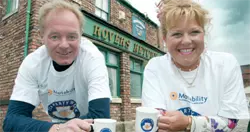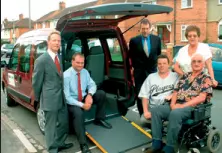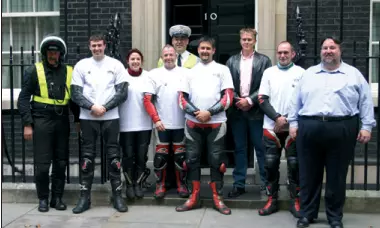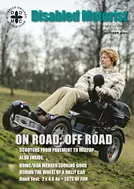|
|
|
Merger talks remain positive
The latest initiative to forge a merger between DDMC and the DDA are continuing positively with a meeting in September agreeing to press ahead with discussions.
A joint statement was released following the meeting between the two  organisations. It said: “The trustees of the Disabled Drivers’ Motor Club and Disabled Drivers’ Association held a very positive joint meeting on 4th September and agreed, unanimously, that discussions should continue to seek the merger of both organizations, to better serve the interests of disabled people with mobility difficulties.” organisations. It said: “The trustees of the Disabled Drivers’ Motor Club and Disabled Drivers’ Association held a very positive joint meeting on 4th September and agreed, unanimously, that discussions should continue to seek the merger of both organizations, to better serve the interests of disabled people with mobility difficulties.”
Detailed discussions have begun to take place and all DDMC members will, of course, be given the opportunity to express their views at the appropriate time.
 BRUCE JONES and Wendi Peters, who play Les Battersby and Cilla Brown in the ITV soap Coronation Street, enjoy a cuppa to launch Motability's “Everything Stops For Tea” BRUCE JONES and Wendi Peters, who play Les Battersby and Cilla Brown in the ITV soap Coronation Street, enjoy a cuppa to launch Motability's “Everything Stops For Tea”
fundraising campaign last month.
Bruce said: “We are delighted to launch Motability's Tea Party Week and we hope people up and down the country will enjoy a cuppa, and help transform the lives of many disabled people.” 
So, who did get it wrong . . . DN or Scope?
CONCERNS about the continuing editorial independence of the campaigning newspaper Disability Now (DN), have been raised by an article from Scope chief executive, Tony Manwaring.
In the September issue he states that Scope, DN's publishers, “got it wrong” by allowing a postcard insert from an independent campaign supporting assisted dying to be included with the July
magazine.
Manwaring feels that the decision to carry the postcard “is part of a broader set of issues about the purpose of DN and its relationship with Scope” and that the key issue is “how best to develop an editorial policy for DN which reflects Scope's drive for equality.”
Disability rights campaigner Dr Tom Shakespeare disagrees, arguing:
“Assisted suicide is a complex issue, and there are a range of views in the disability community.” He believes that “DN
has always reported the debate fairly, and it was not inappropriate to include a card from a separate campaigning group who support the right to assisted suicide:
if campaigners against assisted suicide have publicity, DN should include that too. DN should be seen as an independent
campaigning newspaper for the disability community, not the publicity wing of Scope”
Shakespeare argues that he “wants to read, and write for, an independent disability newspaper which tells me things I don't know, challenges my prejudices, and makes me think.” 
An end to discrimination?
NEW EQUAL access laws that have come into force this month will have as dramatic an effect on opening up business and services to disabled people in the UK as similar laws have had in the
United States, according to the Disability Rights Commission (DRC).
Catherine Casserley, Senior Legislative Advisor for the DRC, also
predicted a future in Britain of increased assertiveness amongst disabled people no longer willing to tolerate a second class service.
In the run up to the October 1st deadline the DRC invested heavily in projects aimed at making sure disabled people knew about and asserted their new rights. Increasing the capacity of disabled
people and organisations to monitor progress and complain is also a key aim.
Part 3 of the Disability Discrimination Act (DDA) requires every business from the local shop to restaurants, health clubs, dentists and supermarkets, to become more user-friendly to Britain's
10 million disabled people. Businesses will need to make reasonable changes – such as adapting premises, removing physical barriers or providing the service another way – so that disabled people can use the service.
Ms Casserley drew a strong comparison between the DDA and the Americans With Disabilities Act (ADA). Provisions relating to removing physical barriers to services in the US mirror the duties
now in effect in Britain. Ten years after the introduction of the ADA, the United States has made major advances in making
businesses more user friendly for disabled people.
“What is clear from the high levels of positive acceptance for the changes in the US is the role that an aware and active disability community has played in producing an exemplary environment
for disabled people,” said Ms Casserley.
Commenting on the business case for making improvements to disabled access, she said: “UK businesses will lose out on the spending power of disabled people if they fail to make the
improvements needed to ensure access.
“But it's not just disabled people whose custom they will lose – a national poll commissioned by the DRC revealed that when confronted with poor access seven in every 10 people would advise family or friends to use another service. Bad access really is bad for business.”
Ms Casserley provided a stark warning to businesses and service providers that had made little or no efforts to implement improvements: “Increased awareness and activism amongst disabled people after October 1st is a given.
In this new setting there will be nowhere to run and nowhere to hide for businesses that have not made or planned improvements.
“Over the last year the DRC has been monitoring the progress of well-known service providers and we will be looking to test the law at the earliest opportunity to achieve the maximum effect.” 
Act ‘irrelevant’ to small firms
MORE THAN half of all small business owners (52 per cent) consider the Disability Discrimination Act to be largely irrelevant, according to new research. Even more revealing is the fact that this rises to 60 per cent among firms already subject to the legislation.
The report, sponsored by Lloyds TSB Business and prepared by the Small Enterprise Research Team at the Open University, shows that only four per cent of firms surveyed think that the DDA has had a positive impact.
Furthermore, at a time of concern over a rising tide of red tape, one in five (18 per cent) think it is expensive or troublesome
to implement, while a further 15 per cent say it creates another layer of administration.
The extension of the Act to include firms employing fewer than 20 is also causing concern among small businesses.
More than half (55 per cent) agree the extension is ethical, but claim it puts too much of a burden on business.
Sixteen per cent believe the extension to be unnecessary, while one in ten (11 per cent) think it is an empty gesture that will be impossible to monitor. The last two views are most widely held by
those in the 55-64 age group with 40 per cent citing them, compared with only 10 per cent of those aged 35 - 44. 
Gowrings rental initiative
GOWRINGS MOBILITY have teamed up with car rental firm Dollar
Thrifty to offer wheelchair users and their drivers wheelchair-accessible vehicles to rent.
Four specially adapted Renault Kangoo vehicles will be hired out
to the growing number of people wishing to transport wheelchair
users. The Renault-approved conversion incorporates a lowered floor, a short, lightweight ramp and four-point wheelchair securing system.
Wheelchair users can enter via the ramp at the rear and remain safely and comfortably in their own chair whilst travelling.
The vehicles will be available to rent in the Reading and High
Wycombe areas, and if the scheme is successful it will be extended to all Dollar Thrifty's branches across the country.
To hire a wheelchair passenger vehicle, please contact Reading
01189 511123 ; or High Wycombe 01494 463346 . 
Bikers call for clean-up
A CHORUS of revs from more than 750 motorbikes sent a loud message to the Government of the need to act to slam the brakes on the dangers of diesel spills on Britain's roads.
The bikers from across the country descended on Downing Street to deliver a seven-point plan and 10,146-signature petition to Number 10.
The rally was organised by the KillSpills pressure group as part of a campaign to make diesel spillages as socially unacceptable as drink driving and is believed to be the biggest such bike rally London has ever seen.
Campaign Leader Stephen Edwards, said “A motorcyclist is almost twice as likely to be involved in a serious or fatal
accident as a result of diesel on the road compared to ice.” He said: “The rally was awesome.
It took 11 months to organise but the scale and success of the event was worth the wait. The sight of more than 750 motorbikes, engines revving and horns sounding, wending their way through
Westminster will be difficult to forget.
“We wouldn't have attracted that level of support if people didn't believe we can make a difference. This demonstration was a tangible way to highlight the hazards diesel spills cause. We must now maintain the momentum by lobbying the Government and petroleum companies further as well as educating people at the petrol pumps.”
The bikers have already won the support of Lembit Opik MP, Chair of an All Party Parliamentary Group for Motorcycling; Virgin boss
Richard Branson; London Mayor Ken Livingstone and four times World Superbike Champion Carl Fogarty – and earned a pat on the back from the police on the day.
For more information on the KillSpills campaign see: 
www.KillSpills.org.uk
From small beginnings:
walking for charity
Philip Wood, DDMC Area Representative for Northamptonshire West, is inspired by the efforts of three local people.
THERE is a passion shared by a small group of people whose
aim in life is to give back to society what has been given by
the ambulance service, hospitals and the fire brigade.
I recently met with the three stalwarts of the organization
“Winnie-Fred Walkers” – Angie, Anne and Stephen.
Stephen is a recent recruit, but Angie and Anne have been
walking for charity now for some three years. In that time
they have raised around £1,500 for good causes, including a
hospice in Corby, the Firemen's Benevolent Fund and most
recently for the Air Ambulance Service.
Angie's interest in fundraising dates back to 1997 when she was attracted by an appeal on the local radio for Kids 2000. She has never looked back. Winnie-Fred Walkers was formed in memory of Angie's aunt and uncle who both died from cancer in 2001. Anne teamed up with Angie when she responded to an advert in the local school patrol office for a co-walker to raise money for the Lakelands Hospice in Corby. In the background, but an essential member of the team, is Angie's husband Colin. He's the one who organizes the routes, checks out the safety aspects and does all the driving.
Future events are already being planned; this month there will be a walk around Pitsford Reservoir in Northamptonshire to raise money for breast cancer awareness. Plans are in place to conquer the three peaks, Snowden, Scafell and Ben Nevis in 2005, and in 2008 to walk from Great Yarmouth to Blackpool; both to raise funds for cancer research.
Volunteers and sponsors are sought for all these events, and future fund raising ideas are always welcome. Up to now the focus has been on raising money for Cancer Research, the Ambulance and the Fire Service. However, Winnie-Fred Walkers are open to other suggestions and are willing to try their hand (or feet) at anything providing it is legal and safe!
Their motto is: “We challenge you to challenge us - Do it.”
If you have any ideas, or are interested in becoming a volunteer
or a sponsor then contact Angie on 07979 474175. 
Blue bay blues at Tesco
BAYWATCH supporter Ken Jeffrey has hit out at the failure of his local Tesco store to do anything in response to his constant complaints about bay abuse.
Ken, a wheelchair user, has written to Tesco Customer Services at least six times in the past 12 months about problems that he experiences at the Rainham store, and has even involved his local
newspaper, but he says he is still waiting for action.
Ken argues: “I can't use a normal space. I can't get out of my car if I can't open my door wide. I've tried parking out of the way where there are free spaces to the side of me but if someone parks next to me I can't get back into my car.”
He has detailed a catalogue of abuse and intimidation by able-bodied drivers including incidents where 70 per cent of disabled bays were occupied by non Badge holders. He has begged the store to monitor and prevent abuse and says that in spite of promises to deal with the issue the local store management has
failed to respond.
“On 30th July I met a reporter for the Romford Recorder outside the Rainham store. The duty manager took my details and assured me he would get someone to reply. In spite of the fact that the paper ran a centre page spread on the story entitled Cheating the Disabled I have still heard nothing.”
Tesco Customer Services nationally have responded to Ken's letters by stating, in a standard format, that they value his complaint but, “Regrettably, we have not yet been able to devise a system that completely eliminates this problem.
However, I can assure you that we are actively seeking a viable solution.
“In our new stores we have placed signs between each disabled parking space and we have also painted, in yellow, the recognised “access for the disabled” symbol on the car park surface.
Some of our stores also place tickets on offending vehicles, asking customers to move their cars.”
The Baywatch Campaign has recently submitted its research report to the DfT. The recommendations, which have been made available to all Baywatch partners, including Tesco, detail a range
of actions that can be taken to prevent abuse. 
Common sense . . . and nonsense
ED PASSANT continues his look at disabled motoring worldwide...
Encouraging news from countries that you might not have expected to be in the forefront of developments on mobility
issues this month:
In Uganda, disabled people are among organisations and individuals that have been granted exemptions from import
duties and value added tax. The clause, contained in the Finance Bill 2004, exempts disabled people from paying taxes on motor vehicles and equipment specially designed for the use of disabled
drivers. It also exempts materials designed for educational, scientific or cultural advancement of the disabled to be used by an organisation approved by the government.”
From the Monitor (Kampala).
In China, Beijing, a city that has 622,000 registered disabled citizens among its 14 million population, is introducing a range of access improvements as a result of new laws that came into
effect in May.
The Beijing Traffic Management Authority has announced the creation of 64 disabled parking bays for the exclusive use of disabled motorists. Parking fees will still have to be paid but the new bays will be located in front of destinations such as hospitals, hotels, shopping centres and busy streets to allow better access for people with mobility problems.
Fines of between 50 and 200 yuan (£3.50 and £13.50) will be levied on anyone abusing the bays.
Also in Beijing, 20 accessible buses that have ramps instead of steps are being introduced to add to the 5 currently being trialed. The capital's metro stations are expected to complete a 10
million yuan (£673,000) project to install barrier-free access and facilities for disabled passengers by the end of next year.
Work began earlier this month to install easy-access toilets with lower basins, special paths for visually impaired people and special-access escalators at 30 subway stations along the No 1 and No 2 metro lines.
From the China Daily
Meanwhile at home, Edinburgh traffic wardens displayed a chronic lack of common sense when enforcing Blue Badge parking…
Linda Mitchell had to remove her Blue Badge to apply for a new permit and thought she was taking every precaution by leaving a photocopy of her badge and a note explaining that she was
inside the council offices in Waterloo Place renewing it. She was greeted by a £60 fine, issued only minutes after she had left the car, on her return.
Ms Mitchell said: “Disabled drivers don't pay road tax so my road tax badge had a zero on it next to the cost. A traffic warden could have checked that if he thought the photocopy was not genuine.”
But a spokeswoman for Central Parking System, the firm contracted by the council to enforce parking restrictions,
defended the decision to fine Ms Mitchell. She said: “A penalty charge notice was issued because the disabled badge was not displayed. The badge had been removed and replaced with a
photocopy, which is inappropriate. It is imperative to closely monitor the use of disabled badges to help combat fraud and protect badge holders. Instructions are clearly stated on every parking ticket advising the public any queries should be made in writing to the council.”
Central Parking Systems do not say what you should do when renewing your badge. 
Hotel awards reveal high standards of accessibility
AS THE De Vere Daresbury Park, Warrington, Cheshire, is named AA Accessible Hotel of the Year 2004-2005, an AA survey of its rated establishments reveals a 10 per cent increase in those who provide disability awareness training, and a 14 per cent increase in those that provide written guidelines for disabled guests.
The AA Accessible Hotel of the Year award highlights the
importance of ensuring equal access for disabled travellers to
hotels and B&Bs as part three of the Disability Discrimination
Act is introduced.
Peter Birnie, AA chief hotel inspector, says: “When we first started these awards four years ago we found some establishments had made their properties accessible but hadn't looked at the 'soft' skills needed. This has changed over the years and our data now shows that establishments have understood the importance of physical access as well complementing it with staff training. Simple staff awareness of disabled guests' needs can make all the difference to someone's stay.”
De Vere Daresbury Park was chosen after a series of tough tests, including an assessment of accessible facilities by AA inspectors who use an 80-point checklist, an anonymous telephone survey, a questionnaire and overnight visits from an undercover judge.
Each year an undercover judge with a different judge with a different
disability makes a final assessment from a shortlist. This year's judge, Rebecca Tadman, who is deaf, said: “The
employees were proactive,
anticipating my needs and making me feel comfortable
throughout my stay. They made me feel like any other guest.”
De Vere Daresbury Park was chosen for its special attention
to facilities for the disabled traveller, such as friendly
deaf-aware staff, explanation of emergency and evacuation
procedures including the offer of a vibrating pillow, dedicated
disabled parking, lifts, large accessible rooms and an internet
phone in reception.
The hotel receives a cheque for £1,000 to be used for further
improvements for disabled guests. 
Looking for mystery shoppers
THE GRASS Roots Group is looking for disabled people interested in joining their panel of mystery shoppers.
This involves pretending to be an ordinary customer and showing interest in goods or services at a particular outlet.
For instance, you could be asked to visit a local supermarket or telephone a bank asking a few simple questions.
Grass Roots is commissioned to check the accessibility of services
for disabled customers and how such customers are treated in general. The information is then reported back in confidence to the company concerned, enabling them to improve their services
if necessary.
Disabled mystery shoppers can be paid between £10 and £12 for a personal visit, along with travel and food expenses if visiting a restaurant, and £4-£7 for contacting companies via telephone,
textphone or typetalk.
Disabled mystery shopping is billed as “fun, interesting and valuable – it helps companies provide adequate access and even-handed treatment. And with over eight million disabled people
in the UK, your view counts.”
For more details, contact: James Ewart, The Grass Roots Group, Bellis House, Icknield Industrial Estate, Tring, Herts, HP23 4BR
email: .
Phone: 01442 829278
Textphone: 01442 829335 
‘Check before you spend’ warning
DISABLED CONSUMERS are wasting millions of pounds each year on disability aids available free of charge.
During National Consumer Week (October 18 - 22), RNID, the largest charity representing deaf and hard of hearing people in the UK, is alerting consumers that technology such as flashing doorbells, phone amplifiers and visual smoke alarms is often available at no cost.
RNID is also advising consumers to contact Social Services or a major disability charity before buying disability aids which may also be inappropriate for them. 
|
|
|
 |

